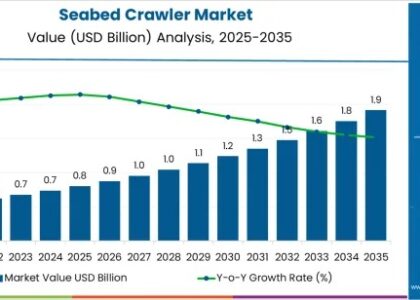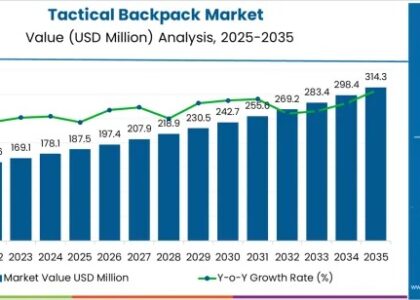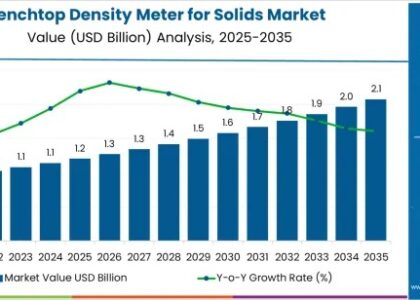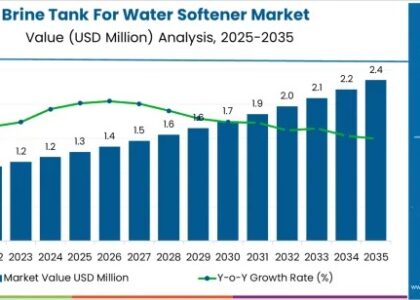The TCU market place primarily anticipates the achievement of the record-breaking level of USD 14 Billion in 2025 and the unveiling of a compound annual growth rate (CAGR) of 5.1%, that shall permit it to attain a value of USD 24 Billion in 2035.
As vehicles evolve from mechanical machines to smart, software-driven platforms, the automotive Transmission Control Unit (TCU) is taking center stage in shaping how modern drivetrains perform. More than just a component that manages gear shifting, the TCU has become a critical brain behind smooth performance, fuel efficiency, and integrated vehicle intelligence.
From conventional internal combustion vehicles to hybrid and electric drivetrains, TCUs are enabling adaptive, responsive, and efficient power delivery—while also supporting the transition toward connected and autonomous mobility.
Get Ahead with Our Report: Request Your Sample Now!
The Brain Behind the Gearbox
The Transmission Control Unit plays a pivotal role in regulating how and when a vehicle shifts gears. It processes real-time input from sensors across the powertrain, interpreting driver behavior, road conditions, and engine performance to select the most appropriate gear ratio.
This electronic control optimizes engine torque, improves fuel economy, and enhances overall driving comfort. As transmissions become more complex—with dual-clutch, CVT, and multi-speed configurations—advanced TCUs are essential for coordinating the precise, timely shifts that drivers expect in modern vehicles.
EVs and Hybrids Reshape Control Demands
With the growing adoption of hybrid and electric vehicles, the role of the TCU is evolving. In hybrids, TCUs manage the interaction between the electric motor and the internal combustion engine, ensuring seamless transitions between power sources and maximizing energy regeneration during braking.
In electric vehicles, where traditional gear systems are minimal or absent, transmission controllers take on new functions—such as managing torque distribution across dual motors or supporting software-defined gear modulation for performance tuning. This evolution is expanding the scope and complexity of TCU applications.
Integration with ADAS and Vehicle Electronics
Today’s TCUs do not operate in isolation—they are increasingly integrated into a network of electronic control units (ECUs) that manage everything from steering and braking to infotainment and ADAS. Communication between these systems ensures that gear shifts are synchronized with adaptive cruise control, hill start assist, and traction control systems.
This high level of integration requires sophisticated hardware and software, along with secure and low-latency communication protocols. As vehicles become more connected and autonomous, TCUs must work in concert with other subsystems to support safe, coordinated driving experiences.
Exhaustive Market Report: A Complete Study
Software-Defined Transmissions and Over-the-Air Updates
The rise of software-defined vehicles is reshaping the TCU landscape. Modern TCUs now support over-the-air (OTA) updates, enabling manufacturers to improve shift logic, add new features, or recalibrate performance parameters remotely.
This flexibility reduces the need for physical recalls, shortens development cycles, and allows automakers to tailor driving characteristics based on user feedback or changing environmental standards. The TCU becomes not just a controller but an upgradable, adaptable system contributing to the overall intelligence of the vehicle.
Performance, Efficiency, and Emissions Compliance
One of the core benefits of advanced TCU technology is its contribution to fuel economy and emissions reduction. By optimizing gear shifts and reducing engine strain, TCUs help manufacturers meet increasingly strict global efficiency and emissions regulations.
In performance vehicles, the TCU also plays a critical role in delivering rapid gear changes, launch control, and driving mode customization—offering both everyday efficiency and high-end performance based on driver preference.
Challenges of Complexity and Cybersecurity
As TCUs grow more sophisticated, so do the challenges in their development. Ensuring compatibility with multiple vehicle platforms, managing real-time data flow, and maintaining system stability are complex tasks. Additionally, with increased connectivity comes the risk of cyber threats.
Automotive cybersecurity is now a major consideration in TCU design, with features such as encrypted communication, intrusion detection systems, and secure boot protocols becoming standard. Ensuring the safety and reliability of these systems is vital for maintaining user trust and regulatory compliance.
Growing Demand Across Vehicle Segments
The demand for intelligent transmission control is no longer limited to premium vehicles. Mid-range and entry-level models are increasingly being equipped with advanced TCUs to improve efficiency and driver experience. Commercial vehicles and off-highway machinery are also adopting smart transmission systems to reduce maintenance costs and improve productivity.
This democratization of TCU technology is fueling market expansion and encouraging innovation in scalable and cost-effective solutions that can serve a diverse range of vehicle types.
Looking Ahead: AI, Machine Learning, and Predictive Control
The future of the automotive TCU market lies in predictive and adaptive control. AI-powered TCUs will be able to learn driver behavior, traffic patterns, and environmental conditions to optimize performance in real time. Machine learning algorithms can help anticipate road gradients or congestion, adjusting transmission logic to suit changing conditions.
As autonomous driving becomes more prevalent, the TCU will play a central role in coordinating with perception and planning systems to deliver precise, safe, and smooth vehicle control.
Enabling Intelligent Mobility
In the shift toward electrified, connected, and autonomous transportation, the automotive Transmission Control Unit is emerging as a foundational technology. It enables vehicles to perform efficiently, adapt intelligently, and operate safely across a wide range of driving conditions.
By combining precision engineering with advanced software, the TCU is transforming how vehicles move—quietly powering the next generation of mobility with every shift, every drive, and every decision made on the road.
Drive Your Business Growth Strategy: Checkout the Report for Key Insights!
About Future Market Insights (FMI)
Future Market Insights, Inc. (ESOMAR certified, recipient of the Stevie Award, and a member of the Greater New York Chamber of Commerce) offers profound insights into the driving factors that are boosting demand in the market. FMI stands as the leading global provider of market intelligence, advisory services, consulting, and events for the Packaging, Food and Beverage, Consumer Technology, Healthcare, Industrial, and Chemicals markets. With a vast team of 400 analysts worldwide, FMI provides global, regional, and local expertise on diverse domains and industry trends across more than 110 countries.
Contact Us:
Future Market Insights Inc.
Christiana Corporate, 200 Continental Drive,
Suite 401, Newark, Delaware – 19713, USA
T: +1-845-579-5705
For Sales Enquiries: sales@futuremarketinsights.com
Website: https://www.futuremarketinsights.com
LinkedIn| Twitter| Blogs | YouTube






